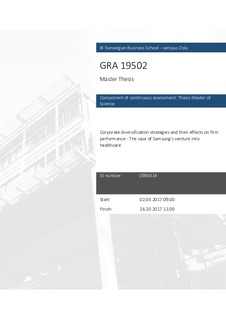Corporate diversification strategies and their effects on firm performance - the case of Samsung's venture into healthcare
Master thesis
Permanent lenke
http://hdl.handle.net/11250/2478320Utgivelsesdato
2017Metadata
Vis full innførselSamlinger
- Master of Science [1621]
Sammendrag
The question of how and why firms diversify has been a focal point of strategy
research for several decades. However, results have been contradictory, especially
in regard to the diversification-performance dichotomy. While there is a certain
acceptance for the curvilinear relationship between the degree of relatedness of
the target industry and firm performance i.e. performance increases in
(constrained) related cases, and decreases with decreasing levels of relatedness,
some studies have found reverse effects. This thesis investigates the nature of
unrelated diversification through a case study on Samsung’s venture into
healthcare. By comparing Samsung’s recent diversification into the medical
device and biosimilar industries in terms of industry relatedness, market entry
strategies, and firm performance, the thesis will present a case in which the
unrelated diversification target (biosimilars) is outperforming the (constrained)
related one (medical devices). As such, this thesis will present an alternative to the
established theory on corporate diversification strategies. Based on a combination
of the external, internal, and financial perspectives of diversification theory, this
thesis finds that the case of Samsung’s venture into healthcare contradicts several
prior findings from the external and internal perspectives, while confirming most
of the theories from the financial perspective. As diversification research has
historically been grouped into studies on firms from developed and emerging
markets respectively, the case of Samsung presents the opportunity to analyze a
conglomerate that has developed in the context of an emerging economy, which is
currently transitioning quickly towards a developed country. As such, Samsung
needs to adapt its approach to conducting business in globalized and hyper
competitive markets.
Keywords: Corporate diversification strategies; firm performance; related and
unrelated diversification, Samsung, healthcare.
Beskrivelse
Masteroppgave(MSc) in Master of Science in Business, International business - Handelshøyskolen BI, 2017
